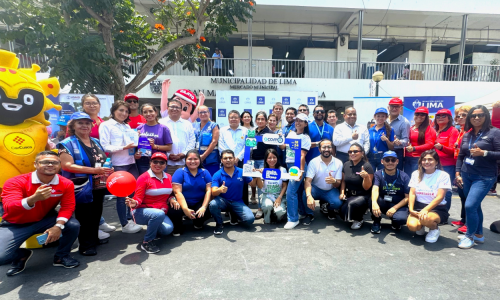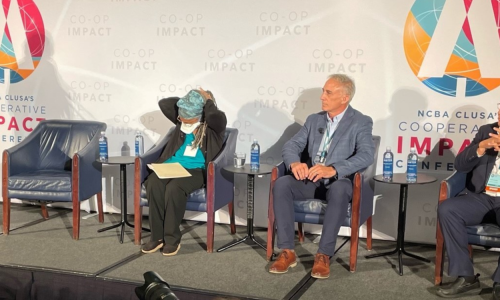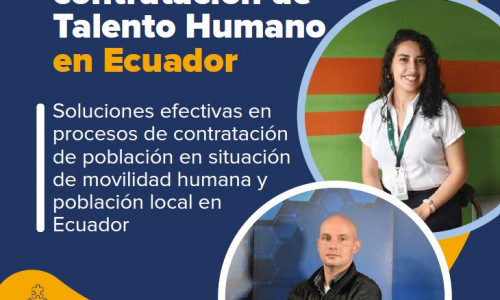Project Overview
According to the most recent data from R4V, as of May 2024, there are 7.77 million Venezuelan refugees and migrants globally, and 6.59 million of these individuals have migrated from Venezuela to Latin American countries.iii With an estimated 1.54 million Venezuelan refugees and migrants in Peru and 444,800 in Ecuador as of May 2024,iv both countries continue to face several challenges related to the Venezuelan migration crisis, worsened by political instability, inequality, social upheaval, and a surge in violence and crime. These factors severely limit migrants' and refugees' access to decent work and livelihoods, while also exposing them to increased violence and xenophobia.
WOCCU committed to supporting this ongoing collaboration with the United States Agency for International Development (USAID) for implementation of the Economic Inclusion Project (EIP), to improve the socioeconomic security for Venezuelan refugees and migrants in Peru and Ecuador as well as for the members of the local communities they inhabit in the target cities of Lima, Trujillo, Arequipa, Ica, Piura, and Callao in Peru and Quito, Guayaquil, Manta, Ibarra, and Cuenca in Ecuador.
Given EIP's success, in May 2023, USAID awarded an extension of the project. During phase one of EIP, from June 2020 through March 2023,
109,679 individuals obtained formal financial services,
15,120 individuals received financial education and literacy training,
12,278 Venezuelan migrants and locals accessed entrepreneurship or employment opportunities, and
2,037 Venezuelans recognized their diplomas or professional or technical degree certifications. Some key targets for phase two include providing an additional:
- 140,000 Venezuelan migrants and locals with access to formal financial services.
- 17,000 individuals with entrepreneurship and employment opportunities.
- 6,000 Venezuelan migrants with support to revalidate their professional or technical degrees and certifications.
To reach its goal, EIP has adapted and implemented entrepreneurship (Objective 1) and employment (Objective 2) training programs targeted at migrants and refugees as well as traditionally excluded local populations. WOCCU also works with its trusted network of financial entity partners, including credit unions, to extend new or adapted financial products and services to Venezuelans and local populations (Objective 3). In addition to these objectives and cross-cutting theme, phase two of EIP will also prioritize:
- Programs and strategies that promote the inclusion of youth.
- Capacity-building for local partner organizations.
[4] Ibid.
EIP’s employment methodology is centered around connecting well-trained job seekers with engaged private businesses recruiting to fill vacancies, providing resources and support to both labor supply and labor demand. EIP provides job seekers with training on technical and soft skills, offers support for the recognition of Venezuelan professional or technical certificates or degrees, and connects job seekers with employers through virtual or in-person job fairs, job boards, and EIP networks while working to strengthen alliances with private sector partners.
By May 2026, EIP will support 6,750 individuals to access new or better employment opportunities or businesses leading to more stable incomes.
Results to Date*
- 8,281 individuals reached through employment training programs
- 4,038 individuals recognized and/or revalidated diplomas or professional or technical certifications
- Primary sectors are humanities and education (33.0%), administration (22.4%), and health (20.5%)
- 848 businesses and 18,671 individuals reached through employment events including job fairs and employment clubs
*Data as of September 30, 2024
Annabely Brito
“The recognition of my degree will open a window of real and effective opportunities to perform functions in accordance with my area of study, which will translate into improvements in my quality of life, as well as that of my family, whom I currently support financially in Venezuela. In short, it will allow me to achieve the physical, spiritual, emotional, social, and familial wellbeing that everyone longs for.”
Annabely Brito is a Venezuelan migrant who holds a degree in aquaculture and also has a master’s degree in rural development. She has been living in Lima, Peru, since 2018. She received financial support from EIP and assistance from Veneactiva during the process to apply for the recognition of her professional degree.
EIP’s financial integration methodology is founded on the premise of enabling access to and use of financial products and services, particularly those that respond to the needs of EIP’s target population. Working with project partners, EIP works not only to increase access to financial services but also to ensure that recipients of financial services are educated and empowered. Through this objective, EIP works to support credit unions and other financial institutions to develop new or adapt existing products and services that meet the needs of Venezuelan migrants and local nationals.
To implement this objective, EIP works closely with a strong network of financial institutions, working side-by-side with each institution to reduce barriers to access and inclusion, develop new and responsive tools, improve processes, revise policies and procedures, implement new or adapted methodologies, and strengthen staff skills and knowledge. Through EIP’s financial education training, EIP participants learn the fundamentals of personal and business financial management before being connected to the financial services sector. This approach ensures that when participants and institutions are linked, both are well prepared and educated on the other’s needs and requirements. Through the following approach, EIP will support 140,000 individuals to access financial services by the end of the project.
Results to Date*
- 181,117 individuals connected with financial services
- 18,280 loans issued, amounting to $19,243,543
- 24,849 individuals trained in financial education, 63% of whom are Venezuelan
*Data as of September 30, 2024
Víctor Solano
“Thanks to the project, I was able to open my account at Financiera Confianza, access a loan, and set goals that have improved my life and my family’s life. Today, I have my own business and continue working to expand it.”
Víctor Solano is a Venezuelan migrant who arrived in Peru in June 2018. After the pandemic, he opened his own restaurant, and thanks to his participation in an EIP financial jornada, he was able to open a savings account and obtain a loan, which allowed him to grow his business. He also attended a financial education workshop that reinforced his understanding of the importance of saving, a habit that has been key to his success. One of his most important achievements was buying his first car, and his future vision is to expand his restaurant to create jobs and offer opportunities to other migrants in Peru.
Supporting Capacity Building
With the project extension, EIP has integrated capacity building as a main EIP component, embracing USAID’s commitment to strengthen local organizations by transferring methodologies and improving capacity.
The institutional strengthening activities aim to have a comprehensive impact on local organizations, improving organizational performance in priority areas by providing tools and strategies to improve quality of services, strengthen business models, and encourage new initiatives that will allow the organizations to expand their reach. EIP will work with a total of five local organizations, three in Peru and two in Ecuador, to provide capacity building support to encourage improved organizational performance.
During Year Four of project implementation, 100% of the local organizations receiving capacity building support showed a measurable improvement in organizational performance.



